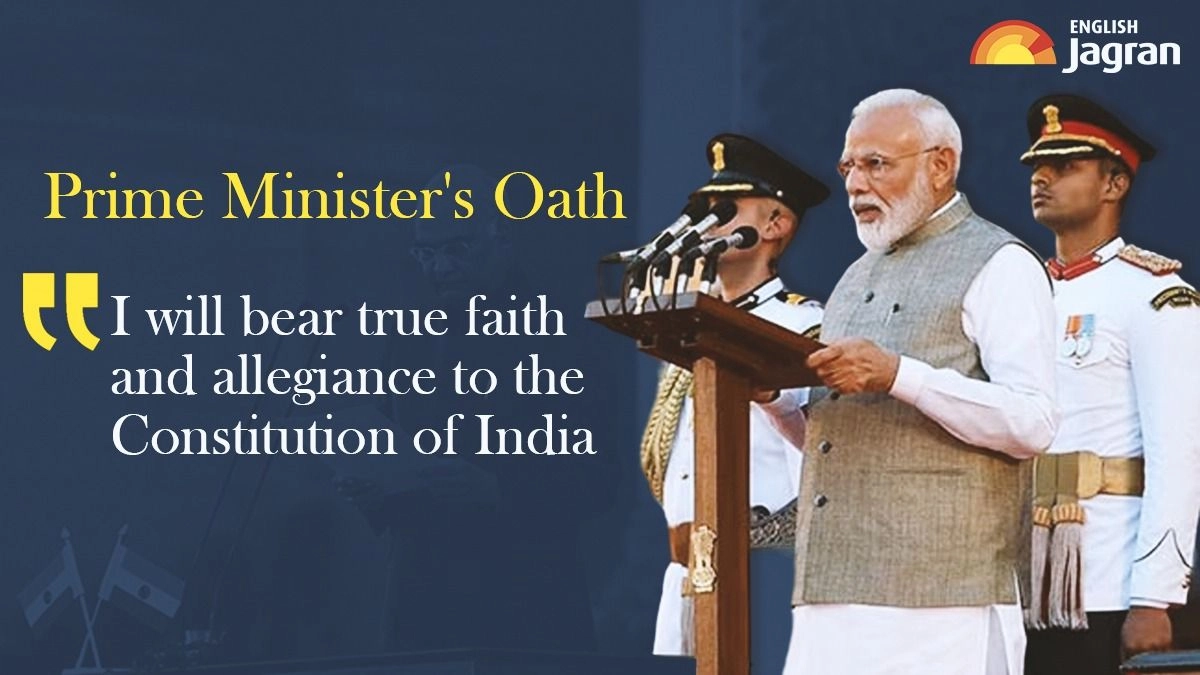- By Imran Zafar
- Sun, 09 Jun 2024 01:10 PM (IST)
- Source:JND
BJP leader Narendra Modi is set to take oath as Prime Minister of India for the third straight term on Sunday evening. Along with Narendra Modi, several elected MPs and NDA leaders are also expected to take oath as Cabinet Ministers in Rashtrapati Bhawan on Sunday. The event is a major constitutional proceeding after the culmination of the world's biggest democratic exercise which will be attended by various heads of state and guests from India and abroad, who have reached Delhi to witness this historical moment.
The oath-taking ceremony is a pivotal tradition that upholds the sanctity of constitutional roles. It is a prerequisite for elected officials, including the President, Prime Minister, Chief Ministers, Ministers, and local Panchayat leaders, to take an oath before commencing their duties. This practice is deeply rooted in the nation’s history and is mandated by the Constitution to affirm allegiance to its principles.
Why Taking Oath Is Mandatory?
Former Lok Sabha Secretary SK Sharma said that Members of Parliament (MPs), Members of Legislative Assemblies (MLAs) and Ministers must pledge their faith in the Constitution of India. Without this formal oath, they are barred from participating in parliamentary activities, including debates and decision-making processes. They are neither assigned a seat in the legislative house nor entitled to salaries and benefits until the oath is administered.
Content Of The Oath - What PM, Union Ministers Swear?
The oath encompasses a commitment to uphold the dignity of the office, to serve with honesty and impartiality, and to safeguard the sovereignty and integrity of India. It can be taken in any recognised Indian language, reflecting the country’s linguistic diversity.
The ministerial oath is twofold: an 'Oath of Office' to honour the position’s dignity and an 'Oath of Secrecy' regarding sensitive information. This bifurcation underscores the dual responsibilities of transparency and confidentiality inherent in governmental roles.

PM Oath Of Office
''I, (name), do swear in the name of God that I will bear true faith and allegiance to the Constitution of India as by law established, [that I will uphold the sovereignty and integrity of India,] that I will faithfully and conscientiously discharge my duties as the Prime Minister for the Union and that I will do right to all manner of people in accordance with the Constitution and the law, without fear or favour, affection or ill-will.'' - Constitution of India, Third Schedule, Part I
PM Oath Of Secrecy
''I, (name), do swear in the name of God (or, solemnly affirm) that I will not directly or indirectly communicate or reveal to any person or persons any matter which shall be brought under my consideration, or shall become known to me as a Prime Minister for the Union, except as may be required for the due discharge of my duties as Prime Minister.'' - Constitution of India, Third Schedule, Part II

What Happens When An Oath Is Broken?
When an individual sworn into a constitutional position breaches the confidentiality agreement, they may be subject to a formal procedure known as impeachment for their removal. While typically such a breach does not result in criminal charges, should there be allegations of fraud, criminal proceedings could be initiated.
Oath Taking Ceremony In Lok Sabha
In the Lok Sabha, all Members of Parliament (MPs) elected from 543 constituencies across the country are required to take an oath. This includes the Prime Minister and Ministers, who also take the oath as an MP in the Lok Sabha. The oath is a solemn promise to bear true faith and allegiance to the Constitution of India, uphold the country’s sovereignty and integrity and faithfully discharge the duties of the office.
The Indian Constitution outlines specific rules for oath-taking for multiple constitutional positions:
Article 60: Details the oath of the President.
Article 75(4): Specifies the format of the oath for the Prime Minister and Ministers, which must be taken before the President. Following the oath, an official certificate indicating the date and time is issued and signed by the Prime Minister.
Article 99: Describes the rules for the swearing-in of all Parliament members.
Article 124(6): Governs the swearing-in of Supreme Court judges.
Article 148(8): Pertains to the swearing-in of the Comptroller and Auditor General.
These constitutional provisions underscore the significance of the oath-taking process in India’s democratic framework. The oath serves as a binding commitment to the principles enshrined in the Constitution and the responsibilities entrusted to the elected officials.
